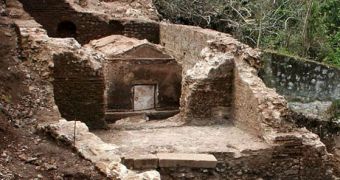A surprising discovery has been made in the Greek island of Kefaloni?, located in the Ionian Sea, between Greece and Italy.
Archaeologists have dug a Roman-era theater and tomb, containing gold jewelry, pottery, and bronze offerings.
This the first finding of this type on an island in the Ionian Sea and it points out a previously unknown route between the two ancient cultures.
British archaeologists have recently proven that Ithaca, the home island of famous hero Ulysses, is now a small peninsula of Kefaloni?.
The site is located near the village of Fiscardo, an important ancient maritime port, and it measures 26 ft x 20 ft (8 m x 6 m).
Fortunately, it was apparently overlooked by looters and it contains five burials, including a large vaulted grave and a stone sarcophagus.
Archaeologists found gold earrings, rings, and leaves that may have been attached to ceremonial clothing, besides glass and clay vases, bronze artifacts decorated with masks, a bronze lock, and copper coins.
"It is the first time such a monument is discovered, not only in Kefaloni? but in all the Ionian Sea islands," stated the Greek Ministry of Culture.
"From the finds so far, we see that Fiscardo was an important naval station between Greece and Italy in antiquity."
"The front of the tomb is particularly interesting, with a stone door that still pivots perfectly on two stone points. It is a touching detail that the door still opens and closes to this day just as in antiquity," the ministry added.
Nearby, the diggings exposed the remains of a small theater with four rows of seats and an orchestra section, all in "excellent condition."
The theater matches with Roman-style structures discovered in Ambracia (western Greece) and Alexandria (Egypt).
Previous diggings in the same area have found remains of houses, a bath complex, and a cemetery, all dating to Roman times (146 B.C. to A.D. 330).
But the new finds could be even older.
"There are [other] bits of evidence of Romans in the islands in the Ionian Sea," said William V. Harris, a professor of ancient history at New York's Columbia University.
"We know that there were Roman fleets there already in the 220s B.C., so that wouldn't be particularly surprising. Roman settlers, though, you would only get in the first century B.C. and perhaps a bit in the second as well. The first substantial contact ancient Romans had with Greeks in Greece itself was probably with the Rhodians-a people based in the Aegean Sea to the east of mainland Greece."

 14 DAY TRIAL //
14 DAY TRIAL //